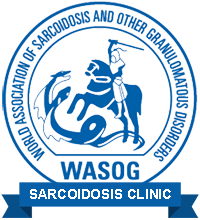Efficacy Results of a 52-week Trial of Adalimumab in the Treatment of Refractory Sarcoidosis
Keywords:
pulmonary sarcoidosis, anti-TNF-α antibody, adalimumabAbstract
Background: Infliximab, a chimeric, monoclonal, anti-TNF antibody has been shown to be safe and efficacious for refractory sarcoidosis, we investigated whether adalimumab, a fully human, anti-TNF monoclonal antibody, is similarly safe and efficacious in refractory pulmonary sarcoidosis. Methods: An open-label, single-center study was conducted in 11 patients with refractory pulmonary sarcoidosis. Patients received adalimumab 40 mg weekly for 45 weeks, with a final follow-up at Week 52. The primary endpoint was the percent change in predicted forced vital capacity (FVC) at 24 weeks. Secondary efficacy parameters included the 6-minute walk test (6MWT), Borg dyspnea score, and Physician’s (PGA) and Patient’s (PaGA) Global Assessments. A successful outcome of the study was defined as reduction in immunosuppressive therapy (prednisone to 10 mg or less), improvement in FVC of 5% or greater, improvement in 6-minute walk test distance (6MWD) of 50 meter or greater at the end of weeks 24 and 52. Results: Eleven patients received adalimumab and had 24-week follow-ups. Only ten patients had a Week 52 evaluation. FVC stabilized in seven patients, and four patients showed improvement in FVC. Five patients had improved 6MWD, and nine had lower Borg dyspnea scores. PGA and PaGA improved at weeks 24 and 52 for all patients (P<0.008 for all comparisons). Among 11 patients who underwent adalimumab treatment, 9 (82%) and 8(80%) had a successful outcome at the end of 24 and 52 weeks respectively. No severe adverse incidents were reported. Conclusions: In this small, open-label study, adalimumab improved refractory pulmonary sarcoidosis and was well tolerated (ClinicalTrials.gov identifier NCT00311246).
Downloads
Published
Issue
Section
License
This is an Open Access article distributed under the terms of the Creative Commons Attribution License (https://creativecommons.org/licenses/by-nc/4.0) which permits unrestricted use, distribution, and reproduction in any medium, provided the original work is properly cited.
Transfer of Copyright and Permission to Reproduce Parts of Published Papers.
Authors retain the copyright for their published work. No formal permission will be required to reproduce parts (tables or illustrations) of published papers, provided the source is quoted appropriately and reproduction has no commercial intent. Reproductions with commercial intent will require written permission and payment of royalties.

This work is licensed under a Creative Commons Attribution-NonCommercial 4.0 International License.




